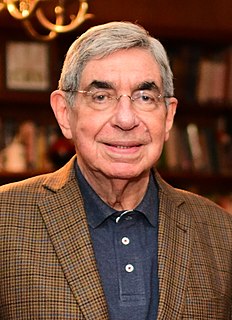A Quote by John F. Kennedy
Let us examine our attitude toward peace itself. Too many of us think it is impossible. Too many think it unreal. But that is a dangerous, defeatist belief. It leads to the conclusion that war is inevitable, that mankind is doomed, that we are gripped by forces we cannot control. We need not accept that view. Our problems are manmade; therefore they can be solved by man. And man can be as big as be wants. No problem of human destiny is beyond human beings.
Quote Topics
Accept
Attitude
Beings
Belief
Beyond
Big
Cannot
Conclusion
Control
Dangerous
Destiny
Doomed
Examine
Forces
Human
Human Being
Human Beings
Impossible
Inevitable
Itself
Leads
Let Us
Man
Mankind
Many
Need
No Problem
Our
Peace
Problem
Problems
Solved
Therefore
Think
Too
Toward
Unreal
Us
View
Wants
War
We Cannot
Related Quotes
I feel like human beings can't help but destroy, but if our numbers are small we don't destroy as much as we do when our numbers are this huge and out of control. I wonder, what's the carrying capacity for human beings? When do we get to the point when we can't take it anymore, when it becomes too unpleasant to us just to be here because there's too many of us and there's no solitude anymore.
Peace does not rest in the charters and covenants alone. It lies in the hearts and minds of all people. So let us not rest all our hopes on parchment and on paper, let us strive to build peace, a desire for peace, a willingness to work for peace in the hearts and minds of all of our people. I believe that we can. I believe the problems of human destiny are not beyond the reach of human beings.
I feel many problems that we are facing, are man-made problems, we have too much emphasis on this secondary thing, forgetting our foundation. At foundation, we are the same human being and we are sharing the same planet. Six billion human beings' future is my future and my future is never separate from the future of six billion human beings.
For my part, I think we need more emotion, not less. But I think, too, that we need to educate people in how to feel. Emotionalism is not the same as emotion. We cannot cut out emotion - in the economy of the human body, it is the limbic, not the neural, highway that takes precedence. We are not robots...but we act as though all our problems would be solved if only we had no emotions to cloud our judgement.
Our problem isn't that the universe isn't on our side; the problem is that too many of us numb these days, not awake to the game, or to the power of the universe that flows through our psychic veins. Some of us need to stop whining. It's not like we're the first generation who faced serious challenges. But others rose to the occasion, and we need to too.
To my mind, you cannot speak about the need for leadership within our communities without being prepared to take on responsibility yourself. It's not enough to point the finger at those who have let us down and to expect others to come forward and fix our problems. Nor can anyone afford to call themselves a leader unless they truly have the interests of our community at heart. Too many people like to think they are leaders and too many are identified by the media as leaders who are not really leaders at all.
I find that many men and women are troubled by the thought that they are too small and inconsequential in the scheme of things. But that is not our real trouble - we are actually too big and too complex, for God made us in His image and we are too big to be satisfied with what the world offers us!.. Man is bored, because he is too big to be happy with that which sin is giving him. God has made him too great, his potential is too mighty.
For my generation - the "Children of Nixon," as I call us in the book - the Lebanese civil war was an iconic event. Downtown Beirut became a metaphor for so many things: man's inhumanity to man, what Charles Bukowski called "the impossibility of being human." It shaped our perceptions of war and human nature, just as Vietnam did for our parents. We used it to understand how the world works.
We are many small puppets moved by fate and fortune through strings unseen by us; therefore, if it is so as I think, one has to prepare oneself with a good heart and indifference to accept things coming towards us, because they cannot be avoided, and to oppose them requires a violence that tears our souls too deeply, and it seems that both fortune and men are always busy in affairs for our dislike because the former is blind and the latter only think of their interest.
Many of us, utterly overcome by Tamas, the dark and heavy demon of inertia, are saying nowadays that it is impossible, that India is decayed, bloodless and lifeless, too weak ever to recover; that our race is doomed to extinction. It is a foolish and idle saying. No man or nation need be weak unless he chooses, no man or nation need perish unless he deliberately chooses extinction.
Peace is a never-ending process, the work of many decisions by many people in many countries. It is an attitude, a way of life, a way of solving problems and resolving conflicts. It cannot be forced on the smallest nation or enforced by the largest. It cannot ignore our differences or overlook our common interests. It requires us to work and live together.
Dreams are impartial, spontaneous products of the unconscious psyche, outside the control of the will. They are pure nature; they show us the unvarnished, natural truth, and are therefore fitted, as nothing else is, to give us back an attitude that accords with our basic human nature when our consciousness has strayed too far from its foundations and run into an impasse.
In The 3rd Alternative, Stephen Covey urges us to chart a course beyond the suboptimal solutions to all our crises - beyond left and right, and beyond the many false choices in front of us. The 3rdAlternative is a wise and welcome echo of Einstein's warning that the problems we're facing today cannot be solved by the same level of thinking that created them.
Our dreams of bringing the whole of human history under the control of the human will are ironically refuted by the fact that no group of idealists can easily move the pattern of history toward the desired goal of peace and justice. The recalcitrant forces in the historical drama have a power and persistence beyond our reckoning.































